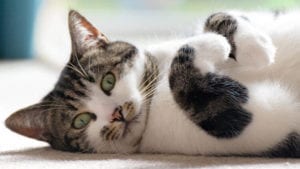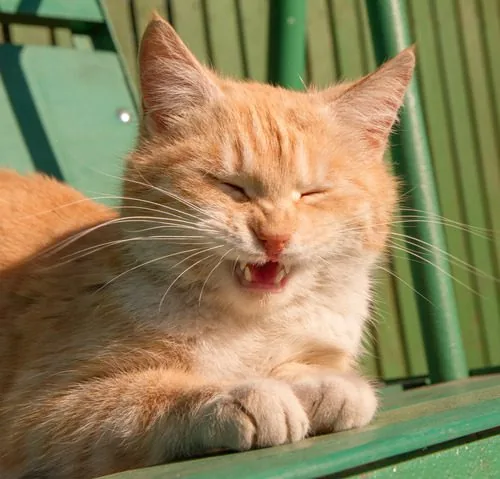Are Cat Hairballs Something to Worry About?
Have you ever seen your cat spit up a hairball? If you’ve been a cat owner for very long—and if you don’t have hairless cats—then chances are good you have. But just because you’ve seen it before, that doesn’t necessarily mean you know what to expect when your cat starts coughing up hairballs frequently.
In this article, we’ll explain what hairballs are and when, if ever, they can pose a problem. By the time you finish reading this article, you should have a much better idea of what’s going on when your cat is dealing with hairballs. If you still have questions, call Boughton Square Animal Clinic in Bolingbrook at (630) 759-0093.
Causes of Hairballs
Normal grooming
The most common cause of hairballs is simply normal grooming. Cats are prone to developing hairballs as part of their regular grooming routine. When your cat licks their fur to groom it, they inevitably ingest some of it, which leads to the hair building up in their stomach.
Hair is difficult for cats to digest, and sometimes it collects in the stomach without passing through the digestive system as feces. When this happens, hairballs form.
Long hair
Cats who have long hair are much more prone to frequent hairballs than those with short hair. If your cat has long hair, their grooming is going to involve the ingestion of even more hair, so they will naturally have worse and more frequent hairballs than other cats might.
Cats with short hair do still have hairballs, however. Your cat’s coat condition also plays a part in the frequency of their hairballs. Of course, a hairless cat does not have hairballs at all—which is one of the perks of having this type of unique feline in your household!
Hairball Treatments
Medication
Most vets recommend trying over the counter hairball preventative medication for your cat before trying anything else more extreme. If your cat has frequent hairballs or has trouble with their hairballs when they occur, this type of medication can make it easier for them to digest the hair and pass it through their digestive system.
Over the counter hairball medication can be purchased from just about any pet store. Your vet might also sell a version of it as well, but you don’t necessarily have to buy it from the veterinarian. Just be sure you purchase a high-quality option.
Surgical removal
Very rarely, some cats may require the surgical removal of hairballs from the digestive tract. This only occurs in extreme situations, and vets will try to do anything else to avoid this possibility unless the cat’s life is in danger. However, there are some situations in which surgical removal is the only option.
If your cat must have a hairball surgically removed, this is a major type of surgery. The vet will give you all the information you need about the proper aftercare for your cat following the procedure. You’ll need to keep up with your cat’s wellness and watch them closely afterward.
When to Worry
Lethargy and loss of appetite
If you notice your cat trying to cough up a hairball but never being able to do so, and if you notice that they are lethargic or uninterested in food, this may be a cause for concern. This could mean that your cat has a hairball that is stuck in their digestive tract and is unable to pass either through feces or by being coughed up.
Take your cat to the vet if you notice these symptoms together. They could be a sign of a wide variety of problems, all of which will require veterinary care to heal.
Vomiting or retching
If your cat is vomiting frequently with hairballs, this may be a sign that they’ve got a small obstruction as well. Just like lethargy and loss of appetite, this symptom along with frequent hairballs is a cause for concern and requires a visit to the vet. Be sure your cat is getting plenty of water while they are vomiting, too, because it is easy for a cat to dehydrate very quickly.
Retching—that is, trying to vomit but never producing anything—is a sign that the obstruction may be severe. Take your cat to the emergency vet if you think this is the case.
Do you feel like you know a little bit more about your cat’s hairballs now? As you can see, hairballs are almost always nothing to worry about, and it’s perfectly normal for your cat to cough them up frequently.
Talk to Your Vet
Of course, as with any issues relating to your cat’s health and wellbeing, you should always talk to your vet for more information if you have any concerns. Your cat’s hairballs could become serious in some rare instances, and your vet will be able to tell you whether or not this is a potential risk for your pet. Call Boughton Square Animal Clinic today at (630) 759-0093.
Recent Posts
6 Possible Causes for Your Cat’s Sneezing
6 Possible Causes for Your Cat’s Sneezing Cats are known for their curious and playful nature, but…
Why is My Dog Eating Grass?
Why is My Dog Eating Grass? Dogs are known for their curious behaviors, and one that often…
Can Dogs Eat Marshmallows?
Can Dogs Eat Marshmallows? Marshmallows are a popular treat for many people, but pet owners often wonder,…
Can Dogs Get Sunburn?
Can Dogs Get Sunburn? As summer approaches and the days get longer, many pet owners look forward…
Dog Dehydration: Symptoms, Treatment and Prevention
Dog Dehydration: Symptoms, Treatment and Prevention Dehydration in dogs is a common but often overlooked condition that…
About Boughton Square Animal Clinic
Since 1979, Boughton Square Animal Clinic has served Bolingbrook, IL and surrounding communities as both a veterinary care provider and a devoted partner in treating your animal family members for life.







